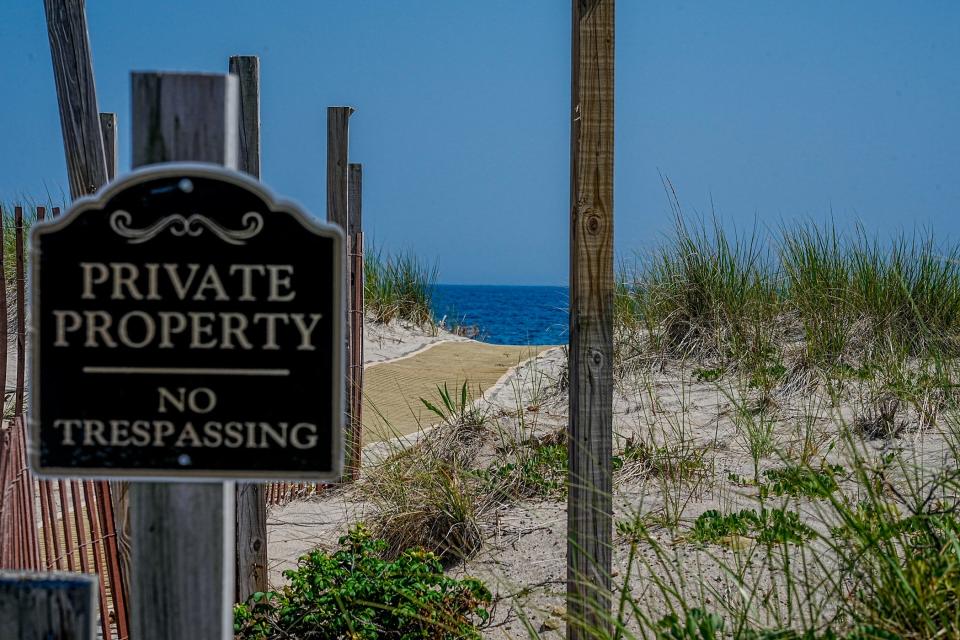Coastal homeowners want to stop enforcement of new RI beach access law as lawsuit plays out
PROVIDENCE – A coalition of coastal landowners moved in federal court Tuesday for an injunction to block enforcement of Rhode Island’s new shoreline access law, arguing it strips them of their right to lawfully exclude strangers from their property without just compensation.
The Rhode Island Association of Coastal Taxpayers is seeking a preliminary injunction in U.S. District Court to block the new law, which allows the public to use the shoreline up to 10 feet inland of the seaweed line. They allege the law goes against 100-plus years of court precedent identifying the seaweed line as the landward extent of the public’s “shore” access and amounts to an unconstitutional taking under the Fifth Amendment.
It is the latest shot in the legal tussle in Rhode Island over shoreline access, led by South Kingstown property owner David Welch, president of the Coastal Taxpayers Association, which is described as having about 50 members, half of whom own beachfront property.
What are the coastal taxpayers arguing?

Rhode Island Association of Coastal Taxpayers, or RIACT, sued the state earlier this month through Attorney General Peter F. Neronha, seeking to overturn the law.
"While public beach access may be important to state legislators and officials, they may not simply redefine private shorelands as a 'public beach' by the stroke of a pen, consistent with the Takings Clause of the Fifth Amendment," the complaint argues.
More on beach access: Middletown shoreline access confrontation turns into viral video – and it raises questions
Neronha, named a defendant in the case along with the Department of Environmental Management and the Coastal Resources Management Council, indicated on Twitter that he was up for a fight.
"'Get off my sand'? Please," he wrote, adding, "We’re ready."
A spokesman for the attorney general’s office did not immediately respond to an inquiry Wednesday,
RIACT argues its members will suffer `irreparable’ harm
Now, the association argues a preliminary injunction to halt the enforcement of the new law is warranted because the group is likely to prevail on the merits of its takings claim, and that members will suffer irreparable harm otherwise due to the law’s failure to provide an adequate monetary remedy to compensate them.
RIACT’s recent filing chronicles beachfront showdowns in which shoreline rights’ advocates have “intentionally” entered onto members’ beachfront properties in South Kingstown and Charlestown, under color of the law.
Welch cited a local coastal activist entering his neighbors’ property above the seaweed line July 3, while urging other members of the public to join him. When the activist – identified in news stories as Scott Keeley – approached a private security guard hired by Welch’s neighbors, the guard told him he could not set up beach equipment on property inland of the water line.
Keeley objected and called the Charlestown police to press charges against the guard for trying to exclude him from "privately owned" property lying between the seaweed line and 10 feet inland, the complaint alleges. An officer from Charlestown told the security guard that Keeley had the right to be there under the law, an exchange captured on video taken by Keeley.
Welch argues that he and other members of RIACT fear that they can and will be criminally or civilly penalized under a state law prohibiting obstruction of public rights of way “if they attempt to stop people from occupying private beach property under color of the [new law] and will therefore refrain from excluding members of the public from their property in some instances.”
“Issuing such an injunction will not harm the public interest. Since the public never had a beach easement on private property located landward the [mean high water] line prior to the Act, an injunction will take nothing from the public. It will simply return property interests along the coast to the pre-Act status quo and ensure that countless coastal owners do not have their property rights and investments suddenly and unconstitutionally injured,” the complaint argues.
RIACT, which is being represented by the Pacific Legal Foundation, has requested a hearing before U.S. District Court Judge William E. Smith.
This article originally appeared on The Providence Journal: Enforcement of RI beach access law could stop as lawsuit plays out

